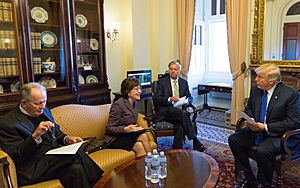Susan Collins facts for kids
Quick facts for kids
Susan Collins
|
|||||||||||||||||||||||||||||||||||||||||||||||||||||
|---|---|---|---|---|---|---|---|---|---|---|---|---|---|---|---|---|---|---|---|---|---|---|---|---|---|---|---|---|---|---|---|---|---|---|---|---|---|---|---|---|---|---|---|---|---|---|---|---|---|---|---|---|---|
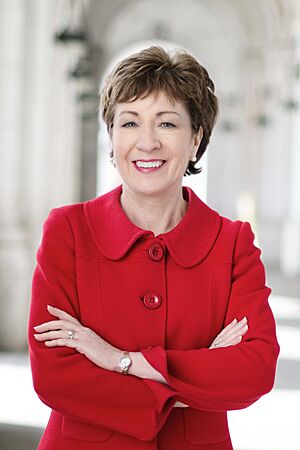
Official portrait, 2014
|
|||||||||||||||||||||||||||||||||||||||||||||||||||||
| United States Senator from Maine |
|||||||||||||||||||||||||||||||||||||||||||||||||||||
| Assumed office January 3, 1997 Serving with Angus King
|
|||||||||||||||||||||||||||||||||||||||||||||||||||||
| Preceded by | William Cohen | ||||||||||||||||||||||||||||||||||||||||||||||||||||
|
|||||||||||||||||||||||||||||||||||||||||||||||||||||
| Deputy Treasurer of Massachusetts | |||||||||||||||||||||||||||||||||||||||||||||||||||||
| In office 1993–1993 |
|||||||||||||||||||||||||||||||||||||||||||||||||||||
| Commissioner of the Department of Professional and Financial Regulation | |||||||||||||||||||||||||||||||||||||||||||||||||||||
| In office 1987–1992 |
|||||||||||||||||||||||||||||||||||||||||||||||||||||
| Personal details | |||||||||||||||||||||||||||||||||||||||||||||||||||||
| Born |
Susan Margaret Collins
December 7, 1952 Caribou, Maine, U.S. |
||||||||||||||||||||||||||||||||||||||||||||||||||||
| Political party | Republican | ||||||||||||||||||||||||||||||||||||||||||||||||||||
| Spouse |
Thomas Daffron
(m. 2012) |
||||||||||||||||||||||||||||||||||||||||||||||||||||
| Relatives | Donald Collins (father) Patricia McGuigan (mother) Samuel Collins (uncle) |
||||||||||||||||||||||||||||||||||||||||||||||||||||
| Education | St. Lawrence University (BA) | ||||||||||||||||||||||||||||||||||||||||||||||||||||
| Website | |||||||||||||||||||||||||||||||||||||||||||||||||||||
Susan Margaret Collins (born December 7, 1952) is an American politician. She serves as a United States senator for Maine. She is a member of the Republican Party. Senator Collins has held her seat since 1997. She is Maine's longest-serving member of Congress. Since January 2025, Collins has been the chair of the Senate Appropriations Committee.
Born in Caribou, Maine, Collins graduated from St. Lawrence University. She started her career in 1975 working for Senator William Cohen. She later became a commissioner in Maine. In 1992, President George H. W. Bush appointed her to a regional director role. She also worked as a deputy state treasurer in Massachusetts. In 1994, she ran for governor of Maine. She was the first woman from a major party to be nominated for this job.
Collins was first elected to the Senate in 1996. She has been reelected every six years since then. She led the Senate Special Committee on Aging from 2015 to 2021. She also chaired the Senate Committee on Homeland Security and Governmental Affairs from 2003 to 2007. Collins is known as a moderate Republican. She often plays a key role in Senate votes.
Contents
Early Life and Education
Susan Collins was born in Caribou, Maine. Her family has run a lumber business there since 1844. Her parents, Patricia and Donald Collins, both served as mayor of Caribou. Her father also served in the Maine Legislature. Her uncle, Samuel W. Collins Jr., was a judge on the Maine Supreme Judicial Court.
Collins went to Caribou High School. She was president of the student council. In 1971, she joined the United States Senate Youth Program. During this program, she visited Washington, D.C.. She met Margaret Chase Smith, Maine's first female U.S. Senator. Collins is the first person from this program to be elected to the Senate. She now holds the seat that Senator Smith once had.
After high school, she attended St. Lawrence University in Canton, New York. She was elected to the Phi Beta Kappa honor society. She graduated in 1975 with a bachelor's degree in government.
Early Political Career
After college, Collins worked for U.S. Senator William Cohen from 1975 to 1987. She also directed a subcommittee on government oversight.
In 1987, Collins joined the cabinet of Governor John R. McKernan Jr.. She became the Commissioner of Professional and Financial Regulation. In 1992, President George H. W. Bush appointed her as a regional director for the Small Business Administration. After this, she moved to Massachusetts. She became Deputy State Treasurer of Massachusetts in 1993.
Collins returned to Maine in 1994. She won the Republican primary for governor. This made her the first woman from a major party to run for governor of Maine. She lost the general election, finishing third.
In December 1994, Collins became the first executive director of the Center for Family Business at Husson College. She held this job until 1996. Then, she decided to run for the U.S. Senate. Her former boss, William Cohen, was leaving his Senate seat. With his support, she won the primary election. She then defeated Joseph E. Brennan in the general election.
U.S. Senate
Elections

Collins was elected to the Senate in 1996. She has been reelected four times.
She won reelection in 2002, 2008, and 2014. In these elections, she won every county in Maine. In 2020, she faced a tough race against Sara Gideon. This election was very expensive. Despite polls showing her behind, Collins won by a clear margin.
Collins is seen as a moderate Republican. She is an important voice in the Senate. She became Maine's senior senator in 2013. This happened when Olympia Snowe left the Senate.
Key Actions and Votes
First Term (1997-2002)
In the late 1990s, Collins played a role in the Senate's impeachment trial of Bill Clinton. She voted to acquit him. She believed his actions were wrong but not enough to remove him from office.
In 2001, Collins wrote a bill to help military reservists and National Guard members. It allowed them to pause federal student loan payments during active duty. It also helped victims and families of the September 11 attacks. The bill passed in December 2001.
In 2002, the Senate approved creating the United States Department of Homeland Security. Collins helped ensure that certain promises were made about the bill's future changes.
Second Term (2003-2008)
In 2004, Collins helped create a new intelligence role. This new position, the Director of National Intelligence, would oversee spy agencies. She also worked on standards for driver's licenses and IDs for air travel. President Bush signed this bill into law in December 2004.
In 2005, Collins was one of 14 senators who found a compromise on judicial nominations. This agreement helped avoid a major political conflict.
Third Term (2009-2014)
In 2009, Collins helped remove some funding from a large economic stimulus package. She believed that funding should go through the regular budget process.
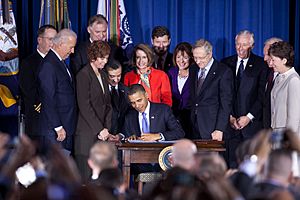
In 2013, Collins opposed the confirmation of Chuck Hagel as Secretary of Defense. She felt his past views did not fit the challenges of the time.
Fourth Term (2015-2020)
In August 2016, Collins announced she would not vote for Donald Trump for president. She said he was not suitable for the office.
In January 2017, Collins voted for Betsy DeVos as Secretary of Education in committee. However, she later voted against DeVos's confirmation in the full Senate.
Collins opposed Republican plans to repeal the Affordable Care Act (Obamacare) in 2017. She believed it should not be repealed without a good replacement.
In 2017, Collins was ranked the most bipartisan senator. This means she worked well with both parties.
In 2018, Collins worked on the Building Our Largest Dementia (BOLD) Infrastructure for Alzheimer's Act. This law helps with public health efforts against Alzheimer's disease.
In February 2020, Collins voted "not guilty" in the first impeachment trial of Donald Trump.
On October 26, 2020, Collins was the only Republican senator to vote against confirming Amy Coney Barrett to the Supreme Court.
Fifth Term (2021-Present)
On January 6, 2021, Collins was at the Capitol when it was attacked. She called the attack "frightening and appalling." She blamed Trump for "inciting this mob." She later voted to certify the election results.
In February 2021, Collins was one of seven Republican senators to vote to convict Trump in his second impeachment trial.
Collins has voted with President Joe Biden about 67% of the time. This shows her willingness to work across party lines.
On October 28, 2021, Collins cast her 8,000th consecutive vote. Only two other senators have had longer streaks. On April 19, 2024, she cast her 9,000th vote, passing one of those records.
Collins voted to confirm Ketanji Brown Jackson to the Supreme Court. She was one of only three Republican senators to support her.
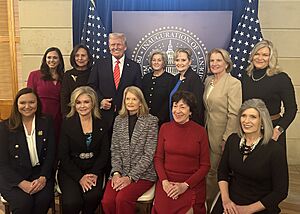
Committee Assignments
Collins serves on several important Senate committees:
- Committee on Appropriations (Chair)
- Committee on Health, Education, Labor, and Pensions
- Select Committee on Intelligence
Caucus Memberships
Collins is part of several groups in the Senate, including:
- Afterschool Caucuses
- Republican Main Street Partnership
- Congressional Coalition on Adoption
- Senate Taiwan Caucus
Political Positions
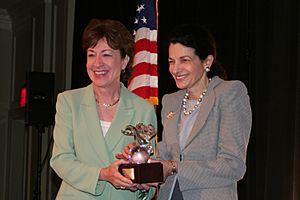
Collins is known as a moderate Republican and a centrist. She often votes with members of both parties. In 2023, she was ranked first among senators for bipartisanship.
Economy
In 2004, Collins had concerns about President Bush's tax cut plans. She voted for the Bush tax cuts in 2003 and their extension in 2006.
In 2017, Collins voted for the 2017 Republican tax plan. This bill lowered corporate taxes. She said she received promises that other laws would help with any negative effects.
Collins voted against the American Rescue Plan Act of 2021. This was a COVID-19 relief package. However, she has voted with Democrats on some spending bills. For example, she voted to approve a temporary spending bill in 2021 to avoid a government shutdown.
Environment
In 2017, Collins was the only Republican to vote against undoing a rule that protected waterways from coal mining pollution. She also voted against the confirmation of Scott Pruitt and Andrew Wheeler to lead the Environmental Protection Agency.
Collins has a high score from the League of Conservation Voters. This shows her support for environmental protection.
Foreign Policy and National Security
In 2003, Collins voted to authorize the Iraq War. In 2007, she supported a plan to withdraw troops from Iraq.
In 2009, Collins questioned sending more troops to Afghanistan. She believed more civilians were needed to help build up the country.
Collins has supported a tougher stance against China's trade practices. However, she wants to avoid a full "trade war."
In 2015, Collins opposed the Iran nuclear agreement. She believed it would still allow Iran to develop nuclear weapons.
Collins has often voted to end U.S. support for the war in Yemen. She has also voted to block some arms sales to Saudi Arabia.
Gun Policy
Collins voted to expand background checks for gun purchases. She voted against a ban on high-capacity magazines.
In 2018, she supported a law to inform states when someone fails a background check for a firearm. In 2019, she supported a bill to prevent people on the no-fly list from buying guns.
In 2022, Collins was one of ten Republican senators to support a bipartisan agreement on gun control. This agreement included measures like "red flag" laws and stronger background checks for young buyers.
Health Care
Collins voted against the Affordable Care Act (Obamacare). However, she later voted against attempts to repeal it without a replacement. She also voted to repeal the individual mandate of the ACA.
Immigration
In 2013, Collins was one of 14 Republicans to vote for a comprehensive immigration bill. This bill included border security and a path to citizenship. She opposed President Obama's use of executive action for immigration reform.
In 2017, Collins opposed President Trump's executive order to ban entry from several Muslim-majority countries. In 2019, she voted against Trump's emergency declaration at the southern border.
Animal Welfare
In 2023, Collins opposed a bill that would have overturned state laws protecting animals in agriculture. This earned her praise from animal welfare groups.
LGBTQ Policy
In 2004, Collins was one of six Republicans who voted against a proposed amendment to ban same-sex marriage. She voted to repeal "Don't Ask, Don't Tell" in 2010. This policy had prevented openly gay people from serving in the military. In 2015, she voted to give Social Security benefits to same-sex couples.
In 2017 and 2019, Collins supported bills to prevent banning transgender people from the military. She also supported laws against housing discrimination based on sexual orientation or gender identity. She was the only Republican to co-sponsor the Equality Act in 2019. This act aims to prevent discrimination against LGBT people. In 2022, Collins was one of 12 Republicans to vote for the Respect for Marriage Act. This law protects same-sex marriage rights.
Net Neutrality
Collins strongly supports net neutrality. This means internet service providers should treat all data equally. In 2017, she worked to reverse a decision that ended net neutrality rules. She believes these rules help rural communities get internet access and protect consumer privacy.
Honors and Awards
- 2013: Spirit of Enterprise Award from the United States Chamber of Commerce.
- 2014: Recognized for "perfect attendance" in the Senate. She had not missed a single vote since 1997.
- 2014: Named one of "10 Most Powerful Women in D.C." by Elle magazine.
- 2014: Received the Publius Award from the Center for the Study of the Presidency and Congress.
- 2017: Received the Congressional Award from the Veterans of Foreign Wars.
- 2022: Received the Academy of Achievement's Golden Plate Award.
- 2024: Included on the BBC's 100 Women list.
Honorary Degrees
| Location | Date | School | Degree | Gave commencement address |
|---|---|---|---|---|
| Bangor, Maine | 1997 | Husson University | Doctor of Public Service | No |
| Biddeford, Maine | 1999 | University of New England | Doctor of Laws (LL.D.) | Yes |
| Castine, Maine | 2007 | Maine Maritime Academy | Doctorate | Yes |
| Waterville, Maine | September 13, 2014 | Colby College | Doctorate | No |
| Augusta, Maine | May 9, 2015 | University of Maine at Augusta | Doctor of Humane Letters (DHL) | Yes |
| Middlebury, Vermont | May 29, 2016 | Middlebury College | Doctorate | No |
| Canton, New York | May 21, 2017 | St. Lawrence University | Doctor of Humane Letters (DHL) | Yes |
| Lewiston, Maine | May 28, 2017 | Bates College | Doctor of Humane Letters (DHL) | No |
Personal Life
Collins is married to Thomas Daffron. He worked as a lobbyist. They were married on August 11, 2012, in Caribou, Maine. Collins is Roman Catholic.
Images for kids
See also
 In Spanish: Susan Collins para niños
In Spanish: Susan Collins para niños
 | Delilah Pierce |
 | Gordon Parks |
 | Augusta Savage |
 | Charles Ethan Porter |


